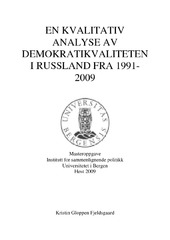| dc.description.abstract | As the Soviet Union collapsed and Russia got independent, a transition to democracy started. Despite a democratic constitution, in which democratic institutions are included, the process stagnated and started reversing in an increasing authoritarian direction. This is the puzzle I seek to solve through the reserach-question: Which factors can explain de-democratization in Russia? This thesis uses traditional democratic consolidation-litterature as a point of departure to explain the de-democratization that Russia is experiencing. I extract the most important variables for explaining democratic consolidation, and categorize them into three sets of variables based on; institutions, economy and political culture. I use these sets of variables to recognize how Russia fits into the concept of democracy, and how the lack of such features can help explaining the de-democratization in Russia. The argument is that these three sets of variables, separately or together, should explain the declining democratic quality, and I expect that the empirical investigation will lead up to a logic mechanism for this explanation. The argument is tested through a casestudy method, process-tracing, which is a useful method for theory-testing, and for investigating deviant cases like Russia. To implement the investigation, I employ scholarly litterature, documents and public statistical data. The results of this casestudy show that a democratic political culture is important to succeed in consolidating a newly established democratic regime. As political culture refers to political attitude, values and behaviour in the population, it is also assumed to be an important aspect for the political institutions. If a democratic political culture is not deeply rooted in the population, the consolidation of both the institutions and the regime in whole, will meet a lot of resistance, and furthermore be vulnerable to democratic decline and authoritarian leaders. The economic variables does not show particular effects on the quality of the democracy, partly because the theoretical approach is ambiguous, and partly because I have investigated these variables in less detail then the institutions and the political culture. As this thesis is a single-casestudy of Russia, the results can not be generalized to a population, neither a direct contribute to theory-development. Nevertheless, by indicating how different alternatives can affect the quality of the democracy , this thesis can be a contribution to expand the research on democratic consolidation and de-democratization in the future. | en_US |
| dc.description.abstract | Oppgaven tar utgangspunkt i tradisjonell demokratiseringslitteratur, hvorfra jeg plukker ut de viktigste variablene og kategoriserer dem i institusjonelle, økonomiske og politisk kulturelle variabelsett. Ved hjelp av disse variablene gjør jeg en casestudie der jeg søker å forklare årsaken til den demokratiske tilbakegangen i Russland. De viktigste funnene i oppgaven er at det politisk kulturelle variabelsettet synes å ha en viktig innvirkning i seg selv, men også gjennom å påvirke utviklingen og stabiliseringen av regimets institusjoner. Russland har verken en demokratisk politisk kultur, eller lykkes med å konsolidere demokratiet som ble innført under Jeltsin. De institusjonelle variablene som er testet virker å bekrefte antakelsene fra teorien, mens de økonomiske variablene peker i flere retninger og gjør det dermed vanskelig å påvise en spesiell virkning på demokratikvaliteten. | en_US |
